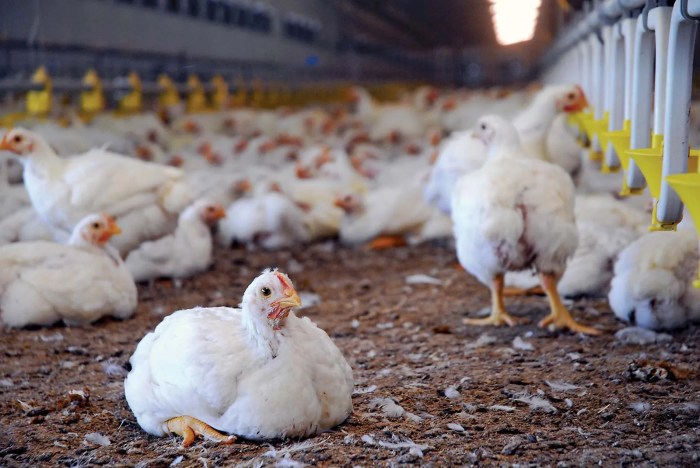
Step right up to the world of Poultry farming best practices, where biosecurity, ventilation, lighting, and waste management reign supreme. Get ready for a clucking good time filled with essential tips and tricks for poultry enthusiasts!
In this comprehensive guide, we’ll delve into the nitty-gritty of ensuring your feathered friends live their best lives on the farm.
Poultry Farming Best Practices

Maintaining best practices in poultry farming is essential for the health and productivity of the birds. This includes implementing various measures to ensure biosecurity, proper ventilation, lighting, and waste management.
Importance of Biosecurity Measures
Biosecurity measures are crucial in poultry farming to prevent the introduction and spread of diseases. By implementing strict biosecurity protocols such as controlling access to the farm, disinfecting equipment, and monitoring the health of the birds, farmers can minimize the risk of disease outbreaks and protect the overall flock health.
Significance of Proper Ventilation Systems
Proper ventilation systems in poultry houses are essential for maintaining optimal air quality and temperature. Good ventilation helps to remove excess moisture, ammonia, and airborne pathogens, creating a healthier environment for the birds. It also ensures proper distribution of fresh air and reduces the risk of respiratory issues.
Benefits of Maintaining Proper Lighting Conditions
Maintaining proper lighting conditions is important for regulating the circadian rhythm of poultry, which can impact their behavior, growth, and egg production. Providing the right amount and type of light at different stages of growth can help optimize poultry health, reduce stress, and improve productivity.
Best Practices for Managing Waste and Litter
Proper management of waste and litter in poultry farms is essential for preventing the buildup of harmful bacteria and pathogens. This includes regular removal of waste, proper disposal methods, and maintaining clean and dry litter for the birds. Implementing effective waste management practices can help improve overall hygiene and reduce the risk of disease outbreaks.
Animal Welfare in Poultry Farming

Providing a comfortable environment and ensuring the overall well-being of poultry is crucial in poultry farming. This includes regular health checks, vaccinations, proper nutrition, and stress management strategies.
Key Elements of Providing a Comfortable Environment
- Proper ventilation to prevent heat stress and maintain air quality.
- Adequate space for movement and roosting to avoid overcrowding.
- Clean and dry bedding to prevent infections and diseases.
Importance of Regular Health Checks and Vaccinations
- Regular health checks help in early detection of diseases and health issues.
- Vaccinations protect poultry from common diseases and ensure their overall well-being.
- Preventive healthcare measures can help reduce mortality rates and increase productivity.
Role of Nutrition in Ensuring Poultry Welfare
- Proper nutrition is essential for growth, development, and overall health of poultry.
- A balanced diet with essential nutrients like proteins, vitamins, and minerals is crucial.
- Access to clean and fresh water is also vital for the well-being of poultry.
Stress Management Strategies for Better Animal Welfare
- Minimize noise levels and disturbances in the poultry environment.
- Handle poultry with care and avoid rough handling to reduce stress levels.
- Provide enrichment activities and adequate lighting to promote natural behaviors.
Livestock Management
Livestock management plays a crucial role in ensuring the well-being and productivity of poultry. From housing systems to disease prevention, every aspect requires careful attention and proper implementation.
Housing Systems for Poultry
Different housing systems can significantly impact livestock management in poultry farming. Here are some common types and their effects:
- Conventional cages: Provide limited space and restrict natural behaviors, leading to stress and decreased welfare.
- Free-range systems: Allow birds to exhibit natural behaviors and have more space, promoting better health and overall well-being.
- Enriched cages: Combine elements of conventional cages and free-range systems, offering more space and amenities for improved welfare.
Proper Handling Techniques
Proper handling techniques are essential for reducing stress and improving the health of poultry. Some best practices include:
- Handle birds gently and avoid rough movements to minimize stress levels.
- Train farm workers on proper handling procedures to ensure the well-being of the animals.
- Regularly monitor the behavior of poultry to detect any signs of distress or discomfort.
Disease Prevention and Control
Disease prevention is crucial in poultry farming to maintain a healthy flock. Here are some best practices for disease prevention and control:
- Implement strict biosecurity measures to prevent the entry of pathogens into the farm.
- Regularly clean and disinfect the poultry houses to minimize the risk of disease transmission.
- Monitor the health of the birds closely and consult a veterinarian at the first sign of illness.
Well-Balanced Diet
A well-balanced diet is essential for the optimal growth and development of poultry. Here’s why it’s important:
- Provides the necessary nutrients for healthy growth, strong immunity, and overall well-being.
- Helps prevent nutrient deficiencies and related health issues in the flock.
- Contributes to higher egg production, improved meat quality, and better reproductive performance.
Conclusive Thoughts
As we wrap up our journey through the realm of Poultry farming best practices, remember that a well-ventilated, well-lit, and biosecure environment, along with proper waste management, is the key to happy and healthy poultry. So go forth and feather your cap with these top-notch practices!
Helpful Answers
Why is biosecurity important in poultry farming?
Biosecurity helps prevent the spread of diseases and ensures the overall health of the poultry flock.
How do proper ventilation systems benefit poultry houses?
Proper ventilation systems help regulate temperature, humidity, and air quality, promoting better respiratory health for the birds.
What are the best practices for managing waste and litter in poultry farms?
Effective waste and litter management involve regular cleaning, proper disposal, and maintaining dry bedding to prevent health issues.





